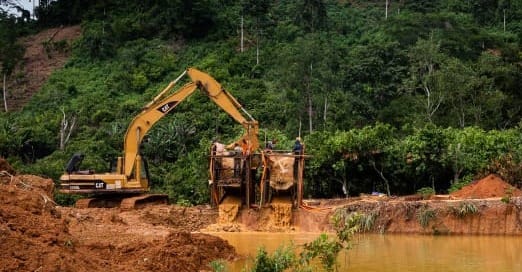Ghana’s Gold Dilemma: Should Small-Scale Mining Continue Abolished?

Gold has long been the backbone of Ghana’s economy. From ancient civilizations to modern-day industrialization, this precious metal has shaped the nation’s financial landscape. Today, however, Ghana stands at a crossroads. The environmental devastation caused by gold mining—especially small-scale operations—raises pressing concerns. Is abolishing small-scale mining the solution? Or would such a move be a short-sighted economic misstep with severe social consequences?
The Double-Edged Sword of Gold Mining
Mining has undeniably driven Ghana’s economic progress. The sector contributes significantly to the GDP, fuels foreign exchange earnings, and provides employment to thousands. The government’s revenue from mining supports infrastructure development, education, and healthcare. Without gold, Ghana's economic stability would be in jeopardy.
Yet, the reality is not all gold. Mining, particularly unregulated small-scale operations, has led to land degradation, deforestation, and water pollution. Cyanide and mercury, used to extract gold, seep into rivers, poisoning communities and threatening aquatic life. Entire ecosystems are collapsing under the weight of unregulated mining.
The question then arises: Can Ghana afford to keep small-scale mining? Or, more critically, can it afford to ban it?
Abolishing Small-Scale Mining: A Dangerous Gamble?
While large-scale mining is heavily regulated, small-scale mining—commonly referred to as galamsey—operates largely in the shadows. Calls for its abolition stem from its devastating impact on the environment and the rampant corruption that enables it. However, banning small-scale mining comes with its own set of challenges.
- Economic Displacement: Thousands of miners depend on small-scale mining for their livelihoods. A blanket ban would strip these workers of income, leading to mass unemployment, rising poverty levels, and potential social unrest.
- Revenue Loss: Ghana’s economy leans heavily on gold exports. Eliminating small-scale mining would mean forfeiting a substantial chunk of national revenue. The government must ask itself: Is there a sustainable alternative to replace this financial gap?
- The Rise of Illegal Operations: Prohibition rarely eliminates a practice—it only pushes it underground. A ban on small-scale mining could embolden illegal operations, exacerbating the very problems the government seeks to eliminate.
The Path Forward: Regulation, Not Eradication
Instead of banning small-scale mining outright, Ghana must refine and reinforce its regulatory framework. The Minerals and Mining Act, 2006 (Act 703) provides a legal foundation, but enforcement remains weak due to corruption, political interference, and inadequate resources.

Here’s what needs to change:
- Strengthened Oversight: Regulatory agencies like the Minerals Commission, the Environmental Protection Agency (EPA), and the Ministry of Lands and Natural Resources must be empowered with the funding and independence necessary to enforce mining laws effectively.
- Technological Innovation: The government should invest in research and development for safer, eco-friendly gold extraction methods, reducing dependence on toxic chemicals like mercury and cyanide.
- Miners’ Education & Support: Many small-scale miners operate without knowledge of sustainable practices. Training programs and financial incentives for adopting green mining methods can transform the industry without sacrificing jobs.
- Diversification of the Economy: Relying solely on gold is a risky economic strategy. Ghana must invest in sectors like agriculture, manufacturing, and tourism to create alternative revenue streams, reducing its vulnerability to fluctuating gold prices.
Greed, Corruption, and Political Inertia
For years, efforts to curb illegal mining have been stymied by greed and political complicity. As the saying goes, “All hat and no cattle.” Leaders make lofty promises to end galamsey, yet the practice persists—often with powerful figures pulling the strings. Without political will, any regulatory reform will be nothing more than words on paper.
The Verdict: A Balanced Approach Is Key
Abolishing small-scale mining is not a viable solution. The focus should be on smart regulation, technological advancements, and economic diversification. Ghana has the resources, the laws, and the knowledge to turn mining into a sustainable enterprise—but it must act decisively.
Now, we turn to you. Should Ghana ban small-scale mining or regulate it more effectively? How can the government ensure that mining benefits the economy without destroying the environment?
Join the conversation in the comments below. Share this article to keep the debate alive!
Comments ()